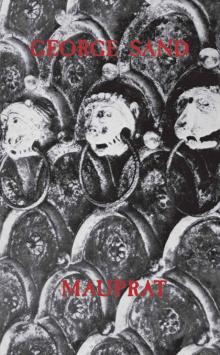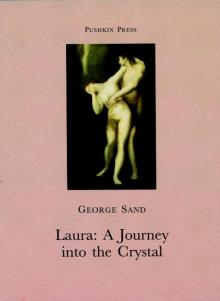- Home
- George Sand
Laura Page 6
Laura Read online
Page 6
As for the world of crystals, I thought about it little of my own accord. My mind, paralysed at the seat of reasoning, did not attempt the least objection to the certainties my uncle set out before me with a singular energy and an ever-growing enthusiasm. His ardent suppositions entertained me like fairy tales, to the point where I could not always distinguish the results of his imagination from something real that might already have happened around me; however, our conversations on this subject always brought me to a singular state of intellectual and physical fatigue, and I found myself on the bed in my cabin, emerging from a profound sleep whose length I could not determine and whose fleeting dreams I could not retrace. I might have suspected my uncle of mixing some mysterious drug into my drink, submitting my will and my reason to his power in the most absolute way; but I had not even the energy to be suspicious. The mood of trust and infantile credulity in which I found myself had its own inexpressible charm, and I did not wish to resist it. Moreover I was, like the rest of the crew and its leader, full of health, well-being, courage and hope.
That is all I can say about myself up to the moment when my memories become clearer, and that moment arrived when our brig passed through the Northern Pillars of Hercules, situated, as everyone knows, at the entrance to the Smith Strait, between Cape Isabel and Cape Alexander.
Despite the frequency and intensity of the storms in that region and at that time of year, no serious danger had delayed our progress, nor compromised the strength of our excellent ship. Only, at the sight of the austere banks which rose up on either side of the channel, laden with mountains of ice more broken up and more menacing than all those to whose presence we had already grown accustomed, my heart skipped a beat, and the faces of the boldest sailors took on an expression of sombre reflection, as if we had entered the kingdom of death.
Nasias alone displayed an astonishing gaiety. He rubbed his hands, smiled at the terrifying icebergs as though they were old friends for whom he had been waiting a long time, and, if the gravity of his role as commander of the expedition had permitted it, he would have danced on the deck, despite the vigorous swell which constantly threw us about.
What can I say? he cried out when he saw that I was far from sharing his intoxication; are you already feeling the cold, and must I advise you on how to warm yourself up?
His face had suddenly become so despotic and so mocking, that I was terrified by this offer whose meaning I did not understand and which I did not wish to have explained to me. I shook off my torpor and put on a brave face until Cape Jackson, where we arrived not without fatigue, but without obstacles, in mid-August. Here, beyond the eightieth degree of latitude, Nasias decreed that we would over-winter in Wright Bay, towards the extreme north of Greenland. Very little time remained for us to prepare this harsh and perilous encampment. The days were shortening rapidly, and I do not know how, at this fluctuating edge of the navigable seas, we had been able to arrive so late without our way being blocked; as it was, we were touching the line of fixed ice, and scarcely had we entered the bay when we were seized as though by the immobility of the tomb.
Our crew, composed of thirty men, did not utter a single murmur. Apart from the fact that they regarded Nasias with an almost superstitious faith, the Tantalus (that was the name of the ship) was so well provisioned, so rich, so comfortable and so spacious, that no-one was afraid of spending a night there lasting several months. We settled in swiftly and in an orderly fashion, and on the day when the pale September sun appeared to us for an instant and then sank behind the faintly empurpled needles of the glacier called Humboldt, not to rise again for a long time, its funeral was celebrated on board with a veritable orgy. Nasias, who up till then had been so stern about discipline and so wisely economical with our resources, allowed the crew to drink until they were intoxicated, and to fill the muffled atmosphere of the darkness, and the mists that were closing in on us, with a savage din, songs and mad shouts.
Then he took me into his cabin, which was always perfectly heated, I know not how, and spoke to me thus:
You are no doubt astonished, my dear Alexis, by my imprudent behaviour; but you should know that everything is planned and that my actions are in no way random. This miserable crew, whose vociferous cries are shattering our eardrums, are destined to perish here, for from today they become perfectly useless to me and rather inconvenient. I intend to continue on alone with you and a band of Eskimo hunters, who are to join us this very night. Together, we shall continue my journey over the sea of pack ice to the open sea that is the sole goal of my labours. So prepare yourself to leave in a few hours and arm yourself with everything necessary to write down the details of our journey, which from now on will become interesting.
I remained stunned for a few moments.
Is that what you are planning, Uncle? I said at last, forcing myself not to sound indignant and so irritate the man to whom I had so imprudently entrusted my fate; are you not pleased to have reached unhindered a limit that no other ship before yours has been able to choose for its winter quarters, not to have yet lost a single man, nor seen any part of your provisions spoiled? How can you believe it possible to go further, during the sun’s long absence, through the bitterest cold that wild animals can bear? How can you be so sure that you will see natives arrive, when you know that those unfortunates are now huddled several hundred leagues to the south, their igloos heated to ninety degrees? And, still more astonishingly, how can you countenance the idea of allowing such a valiant and excellent crew to perish here, scorning all the laws of God and man? This is one of those terrible jokes you have sworn to test me with, but which even a four-year-old child would not be taken in by; for, if you do not care about your brave travelling companions, you surely do care a little, I imagine, about the means of returning to Europe and about a magnificent ship which cannot survive without daily maintenance and running repairs.
Nasias burst out laughing.
I see that your preoccupations are an agreeable blend of prudence and humanity. I see also that fear and cold have weakened your poor brain and that it is time to enliven you again by a method you are unaware of, but which has never failed to work upon you.
What are you planning to do? I cried out, terrified by his cruelly mocking gaze.
But, before I could reach the door of his cabin, he pulled from his breast the little bronze box that never left him, opened it, and promptly showed me the enormous diamond whose inexplicable effect had placed me in his power. This time, I bore its brilliance, and despite the unspeakable pain that the gem’s heat produced in my head, I felt at the same time a kind of bitter sensual pleasure as I allowed it to enter me.
Very good, said Nasias, replacing it in the box, you are becoming accustomed to it, I can see that, and the effect is becoming excellent. Another two or three trials, and you will see into this pole star as clearly as into your poor amethyst geode. Now your doubts have been dispelled, your confidence has returned, and your touching sensitivity has been suitably dulled. Do you not also experience a certain pleasure in undergoing this sort of magnetic operation, which delivers you from the burden of your vain reason and the heavy baggage of your petty pedagogical science?
Now then, all goes well. I hear the delicious songs of our new travelling companions. They will be here in a moment. Let us go and greet them.
I followed him on to the deserted deck, where a profound silence reigned, and, straining to hear, I distinguished in the distance the strangest and most horrible clamour. It was an immense yapping of sharp, plaintive, sinister, grotesque voices, and with each moment that passed the Sabbath was coming closer, as though borne by a gale. And yet the air was calm, and no breath of wind tore at the compacted mist. Soon, the invisible bacchanal was so close to us, that my heart skipped a beat with terror; it seemed to me that a band of famished wolves was about to lay siege to us. I questioned my uncle, who answered me calmly:
These are our guides, our friends and their draught animals, intelligent, robust and
faithful creatures, which I did not want to squeeze on board, and which are coming to join us in accordance with the agreement made in southern Greenland.
I was going to ask my uncle at what stage of the voyage he had made this agreement, when I saw a multitude of red dots dancing on the ice around the ship’s imprisoned flanks, and, by the muted glow of these resin torches, I was able to make out the strange companions who were reaching us. It was a band of hideous Eskimos accompanied by a band of dogs—thin, famished, hackles raised and more like fierce beasts than domesticated animals, harnessed in threes, fives or sevens to a long line of sledges of varying sizes, some of which were carrying light canoes. When they were within shouting distance, my uncle addressed the leader of the band in a loud voice:
Silence your beasts, put out your torches and line up here. Let me count you and let me see you.
We are ready to obey you, great chief angekok, replied the Eskimo, thus hailing my uncle with the title consecrated in his language to magicians and prophets; but, if we put out our torches, how will you be able to see us?
That does not concern you, replied my uncle; do what I tell you.
He was obeyed instantly, and that repugnant phantasmagoria of swarthy, stocky beings, misshapen in their sealskin clothes, those faces with their flattened noses, walrus mouths and fish eyes returned, to my great satisfaction, into the darkness.
All the same, the relief did not last long. A bright light, which for a moment I thought emanated from me, flooded the ship, the caravan and the ice as far as the eye could see, piercing or rather dispersing the fog around our encampment. I did not have to wait long to discover the cause of this phenomenon, for, as I turned back towards my uncle, I saw that he had placed upon his hat the magnificent eastern diamond which up to then had been so difficult to gaze upon, and now was as helpful to us as a portable star would have been; for, at the same time as it was lighting up the horrible night for a considerable distance, it was spreading a warmth as gentle as that of an Italian spring.
When they saw and felt this prodigy, all the Eskimos were stunned and delighted, and prostrated themselves upon the snow, while the dogs, ceasing the hoarse murmurs which had followed their piercing cries, began to yap and bound as a sign of joy.
You see, my uncle then said, you shall never lack for warmth or light with me. Stand up and send the strongest and least ugly among you up here. They shall load all the provisions your sleds can contain. I want only half the men; the rest will over-winter here, if that seems acceptable to them. I shall leave them this ship and all it contains when I have taken what I need.
Sublime angekok, cried out the chief, trembling with fear and greed, if we take your ship, will your crewmen not kill us?
My crewmen will not kill anyone, replied Nasias in a sinister voice. Come up without fear, but none of you must think of stealing the smallest item from what I intend to retain for myself, for at that same moment I shall set light to the ship and all those who are aboard.
And, to prove to them that he had the power, he tapped his diamond with his finger and made a jet of flame shoot forth from it. It flew into the air, sending out a rain of sparks.
I did not involve myself in the Eskimos’ work, nor with loading their vehicles. In spite of the spell that enveloped me, I thought only of Nasias’s mysterious words and the lugubrious silence that had long since succeeded the din of the orgy on the ship. There was not one sailor on deck. The man on watch and the helmsman had abandoned their posts. The natives’ noisy arrival had not troubled any of our companions in their drunken slumber.
I understood clearly that my uncle was taking away or giving to the new arrivals all the food and all the clothes necessary to the crew. Was he also abandoning the lives of these now-defenceless unfortunates to them? The Eskimos have no hint of ferocity in their character, but they are as voracious as sharks and as acquisitive as magpies. No doubt when they awoke our men would find themselves condemned to perish from cold and hunger.
My numbed conscience awoke. I resolved that if need be I would make the crew rise up in revolt, if it was possible to make them understand the situation, and rushed off into the refectory, where I found them all lying pell-mell on the couches or on the floor, in the midst of the debris of broken bottles and overturned tables.
What had happened at this sinister celebration? Blood, mixed with spilt wine and gin, had spread out to form an already glutinous lake about their motionless hands and their soiled clothing. It was an appalling scene of stupor or disaster succeeding some kind of frenzy of rage or despair. I called out in vain: around me reigned the silence of exhaustion … perhaps of death!
I touched the first face that presented itself to my hand; it was ice-cold. The smoking, blackened lamp poured an acrid smoke into this sepulchre, already filled with the stench of the orgy, and, askew on its base, dripped the last of its oil onto hair that stood on end in a final expression of horror. There was no other movement or sound; not a moan, not a death-rattle. They were all wounded, mutilated, unrecognisable, murdered by one another. Some had died while attempting a reconciliation, and lay with their arms entwined, after bidding each other a supreme and distressing farewell in wine-dregs and blood.
I was still standing there, petrified, before this horrible tableau, when I felt a hand take hold of me. It belonged to Nasias who led me outside, and as if he could read my thoughts:
It is too late, he said with a snigger; they will not rebel against the end that saves them from a slow death a hundred times more cruel than this one. I served them up the wine of rage, and, as they fought against imaginary enemies, they were able to console themselves with the dream of a valiant death. All is well with them now: the Eskimos will give them a tomb beneath the ice, as befits bold explorers. Now then, all is ready, follow me. Whether you like it or not, you can no longer go back.
I shall not follow you! I cried. You no longer have me under your spell. The crime you have just committed delivers me from your hateful ascendancy. You are a coward, a murderer, a poisoner, and, if I did not regard you as a madman …
What would you do to Laura’s father? retorted my uncle. Would you then make her an orphan, and could you bring her back single-handedly from the depths of these desert wastes?
What do you mean? Is it possible that Laura …? No, no … You are insane!
Look! replied Nasias, who had led me on deck.
And I saw in an azure cloud the angelic figure of Laura standing on the top step of the companionway outside, preparing to leave the brig.
Laura, I cried, wait for me! Do not leave alone!
And I rushed towards her; but she placed a finger to her lips, and, showing me the sledges, she signalled to me to follow and disappeared before I was able to catch up with her.
Calm yourself, said my uncle, Laura will travel alone in a sledge which I brought along for her. It is she who henceforth will wear our pole star on her brow and who will lead our march to the north. We can only follow her at the distance it pleases her to place between her carriage and ours; but be sure that she will not abandon us, since she is our light and our life.
I followed my uncle mechanically, convinced that this time I was the plaything of a dream, and he made me get into the sledge reserved for me. I was alone in it, lying down in a sort of fur bed, and, although armed with a whip attached to my arm by a strap, I had no thoughts of using it. I was plunged into a strange torpor. I tried to turn over on my moving couch, as if to rid myself of an extravagant reverie: it was in vain; it seemed to me that I was bound hand and foot in my prison of fur. I tried to see the ghost of Laura again; all I could make out was a confused, far-off glow, and soon it became impossible for me to know if I was asleep or awake, if I had halted on the ice or on the earth, or had been borne away in a swift race by some unknown cause.
I do not know how much time I spent in that strange state. Since daylight did not appear and was not going to appear, and since mist hid the sky’s aspect, I no doubt awoke and fell asle
ep again several times, without taking stock of the hours that passed. Finally I felt fully awake, and my vision cleared. The fog had completely disappeared, and the sky was sparkling with constellations whose position enabled me to determine the time with reasonable accuracy. It must be around noon, and I had come a long way, or else I had been travelling for several weeks.
I travelled over the ice, packed hard like a slab of marble, borne along by my dogs, which, without being directed, followed exactly in the tracks of two other sledges that had sped off at top speed. Behind me came the line of other sledges carrying the Eskimos and the supplies.
We followed a narrow ice-channel that ran between two fearsome ice floes, sometimes several hundred, sometimes several thousand feet high. A bright sapphire light seemed to emanate from these terrible environs; I saw them at last as they truly were, delivered as I was from all forms of fear and all moral appreciation of my situation. I felt neither cold nor heat, nor sadness nor terror. The air seemed gentle and smooth, my fur bed soft, and the light running steps of my dogs on the admirably level ground gave me a childish feeling of well-being.
As we passed we made no more sound in that lonely place than a flight of ghosts. I believe that the entire caravan slept deeply or abandoned itself like me to a nonchalant reverie. From time to time, a dog would bite its neighbour to prevent it slowing down, and that dog bit a third, as is the custom with these draught animals, a cry of canine anger would revive the ardour of a team, and called me back to the feeling of locomotion and of life; but these dry, swift sounds, deadened by the effect of the snow, were suddenly lost, and the absolute silence of the polar winter resumed its reassuring and solemn eloquence. Not a single cracking sound in the expanses of ice, not one dazzle of snow, nothing that might have given a warning of the horrible cataclysms which the thaw brings to these floating masses.

 Lelia
Lelia Mauprat
Mauprat Valentine
Valentine The Countess von Rudolstadt
The Countess von Rudolstadt Laura
Laura Indiana (Oxford World's Classics)
Indiana (Oxford World's Classics)